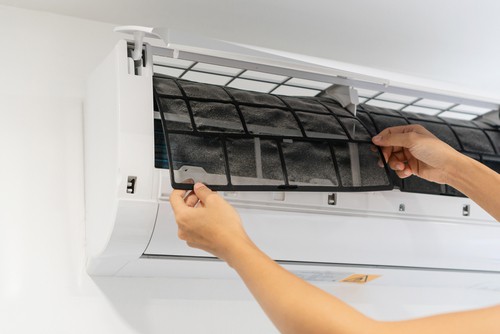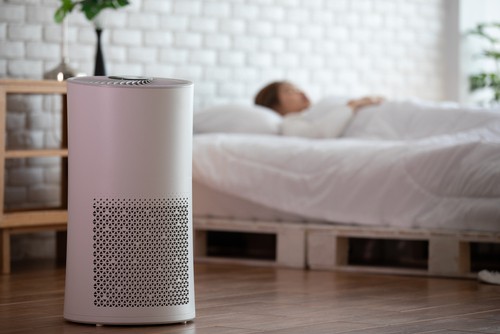What are the signs of poor indoor air quality? Indoor air quality is an important issue in Singapore, where the climate is hot and humid. Poor indoor air quality can cause various health problems, including respiratory infections, asthma, and other respiratory illnesses.
There are several ways to improve indoor air quality, including using air purifiers, ventilation, and keeping the indoor environment clean.
Common Signs

Some signs can indicate poor indoor air quality. The following are some of the most common:
1) Eye irritation
When the air quality is poor, your eyes may become red, itchy, or watery. You may also experience blurred vision.
2) Nose irritation
If the air quality is poor, you may notice that your nose is more congested than usual. You may also have a runny nose, sneezing, or sinus headaches.
3) Throat irritation
Poor air quality can cause a sore throat, coughing, or difficulty breathing. You may also notice that your voice sounds hoarse.
4) Headaches

Headaches are another common symptom of poor indoor air quality. If you experience headaches more often when you are indoors, it could be a sign that the air quality is poor.
5) Fatigue
If you find you are more tired than usual, it could signal poor air quality. Poor air quality can cause difficulty concentrating and make you feel sleepy.
6) Skin irritation
Poor air quality can cause skin dryness, itching, or rashes.
Those are just some of the signs that can indicate poor indoor air quality. If you experience any of these symptoms, it is important to take action to improve the air quality in your home or office.
Common Causes

Several different factors can contribute to poor indoor air quality. The following are seven of the most common:
1) Lack of ventilation
When there is not enough ventilation, the air in a room can become stale and stagnant. This can lead to a build-up of pollutants, including dust, mold spores, and chemicals.
2) Poor filtration
If the air in your home or office is not properly filtered, it can contain many harmful contaminants. These can include dust, pollen, pet dander, and mold spores.
3) Humidity
If the air in a room is too humid, it can provide the perfect conditions for dust mites, mold, and mildew to thrive. This can lead to several respiratory problems.
4) Chemicals
Many common household chemicals can emit harmful fumes. These include cleaning products, paint, and aerosol air fresheners.
5) Radon
Radon is a gas that is produced by the breakdown of uranium in the soil. It can enter homes through cracks in the foundation or other openings. Once inside, it can build up to dangerous levels.
6) Asbestos
Asbestos is a material that was once used in a variety of construction products. It can be found in insulation, flooring, and shingles. If it is disturbed, it can release harmful fibers into the air.
7) Lead
Lead can enter homes through lead-based paint or dust from old pipes. It can cause various health problems, including children’s learning disabilities and behavior problems.
Those are some of the most common causes of poor indoor air quality. If you suspect that the air in your home or office is not as clean as it should be, it is important to take action to improve it.
Tips for Improving Indoor Air Quality

You can do different things to improve the air quality in your home or office. The following are four tips:
1) Use an air purifier
An air purifier can help to remove contaminants from the air. Be sure to choose one that is designed for the specific needs of your home or office.
2) Increase ventilation
Increasing the amount of ventilation in a room can help to improve air quality. This can be done by opening windows or doors or by using fans.
3) Change your furnace filter
It is important to change the filter regularly if you have a furnace. A dirty filter can circulate contaminants back into the air.
4) Avoid using chemicals
When possible, avoid using household chemicals. If you must use them, be sure to open windows and doors to ventilate the area.
5) Dust regularly
Dust can build up on surfaces and release contaminants into the air. Be sure to dust regularly, using a damp cloth or electrostatic mop.
6) Vacuum regularly
Vacuuming can help to remove contaminants from carpets and upholstered furniture. Be sure to use a vacuum with a HEPA filter.
By following these tips, you can help to improve the air quality in your home or office.
Reasons to Improve Indoor Air Quality

You should take steps to improve the air quality in your home or office for several reasons. The following are six of the most important:
1) Health
Poor air quality can cause some health problems, including respiratory problems, headaches, and fatigue. By improving the air quality, you can help to reduce these health problems.
2) Productivity
Poor air quality can lead to a decrease in productivity. This is especially true if the air quality is so poor that it causes health problems.
3) Comfort
If the air in your home or office is not clean, it can be uncomfortable to spend time there. Improving the air quality can make your home or office more comfortable.
4) Sleep
Poor air quality can lead to difficulty sleeping. This is because the contaminants in the air can irritate the respiratory system and cause discomfort.
5) Allergies
If you have allergies, poor air quality can make them worse. Improving air quality can help to reduce the symptoms of allergies.
6) Odors
If the air in your home or office is not clean, it can become stale and unpleasant. Improving the air quality can help to eliminate odors.
Those are just some reasons you should take steps to improve indoor air quality. If you are concerned about the air quality in your home or office, be sure to take action to improve it.
Signs Of Poor Indoor Air Quality – Conclusion

Indoor air quality is important for many reasons. Poor air quality can cause health problems, decrease productivity, and make your home or office uncomfortable.
You can improve the air quality by using an air purifier, increasing ventilation, changing your furnace filter, dusting regularly, and vacuuming regularly. You can improve your health, productivity, and comfort by taking steps to improve the air quality in your home or office.
